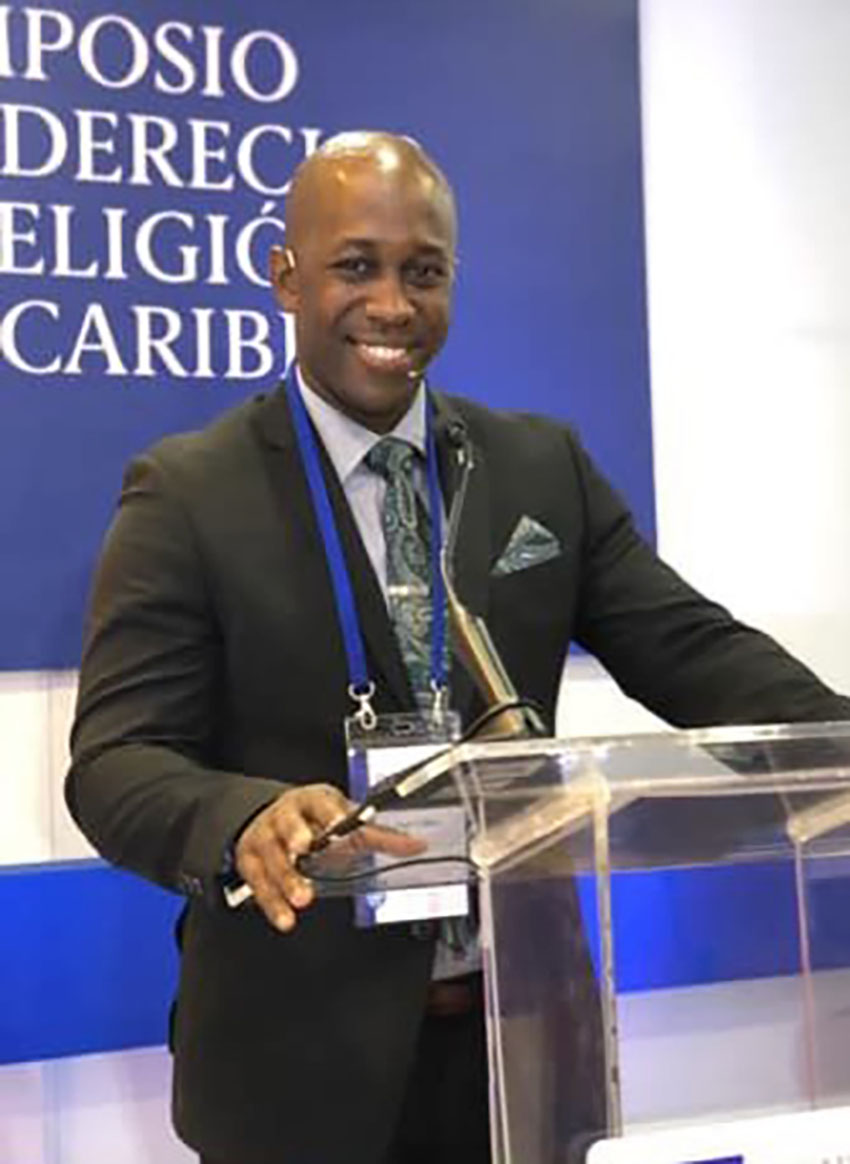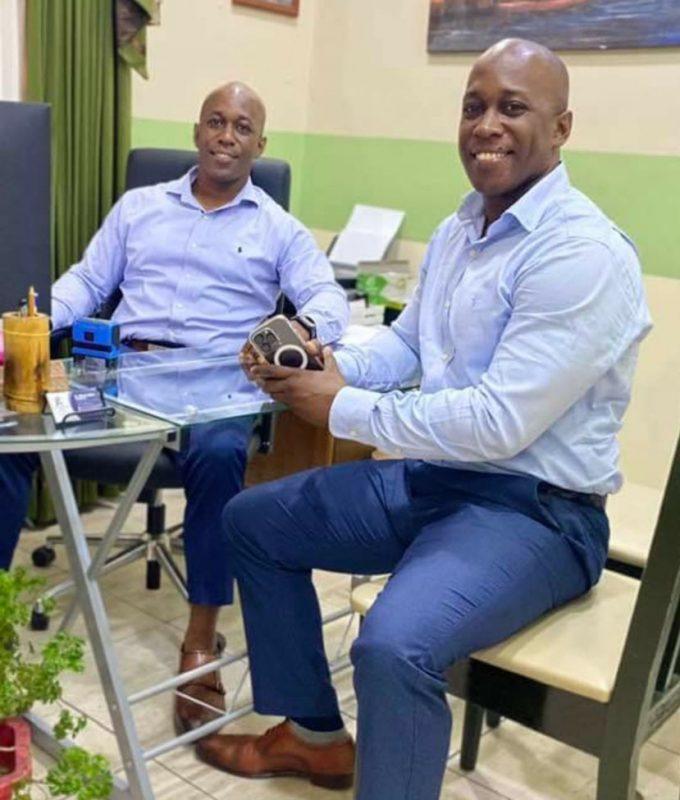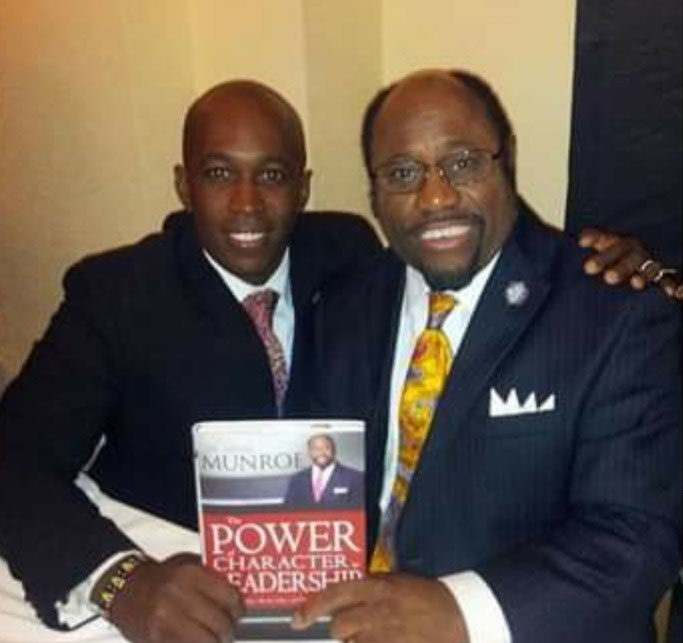From medical technology to marketing his poems in the Caribbean and then to South Africa where he was a mentee and a mentor in leadership development strategies, Astell Collins took his brand of leadership to the political level temporarily and now continues his calling as a leadership strategist.
“Here in Guyana, I’m just trying to make my contribution to the tapestry of leadership development. Leadership is not necessarily having to be political but because of where we are as a nation, sometimes, the only way to influence change or impact development is to become political,” the now 40-year-old Collins told Stabroek Weekend in a recent interview.
“My responsibility today is to transform the next generation, to create an environment necessary for them to become themselves, to help them identify their talents, abilities, gifts, strengths, so they can maximise their potential by facilitating and cultivating a culture among them to better serve,” he stated.
“Our young leaders need to understand what leadership is. Even nationally I don’t think we understand what it is. We have been misguided to think that leadership is a title or a position. We expect too much from people who are given the position and the title, but who have not been taught or socialised to lead based on response.”
On his return to Guyana in December 2012 after living in South Africa for four years, Collins tried to give back to the country by being apolitical.
However, in 2018, APNU political activists in the Campbellville community where he grew up encouraged him to contest the constituency seat in the 2018 local government elections. Cambellville is a traditional PPP/C stronghold and that party retained the seat despite Collins’s efforts.
“When you say politics in Guyana, sometimes the churches don’t want to touch it and you are treated as if you have become stained and evil. They say politics is a dirty game. We have that disinformation about politics. I strongly believe we need to evolve as a nation in our thinking and our appreciation for what politics is about and become politically matured,” he posited. “Until we do, we will continue to be victims of puppet masters in the political arena. I should not be deemed wicked, stink and dirty because I am supporting a political party as a candidate and then if my party is not in power I am victimised, can’t work and not given contracts because I did not vote for the administration. Guyana has an immature political climate and it will not serve us well going forward.”
Having been mentored by the late Bahamian Christian evangelist and leadership expert Dr Myles Munroe, Collins quoted him as saying that a politician might be in a position of leadership but might not necessarily be a leader.
He also quoted Munroe’s definition of leadership as the capacity to influence others through inspiration, motivated by a passion, generated by a vision, produced by a conviction and ignited by a purpose. “That is why when I was asked to contest for the seat it was literally a response to the need of the community,” he said.
“My duty was to give back to Guyana by empowering as many people as I could. That was what I was doing. Because of that I became somewhat influential and so I was encouraged to run for local government elections.”
At that time, he was attached to the office of the then minister of natural resources Simona Broomes. Based on his performance in the local government elections, he was seconded to work with then minister of state in the ministry of the presidency Joseph Harmon as his executive assistant and later on when he was the director general of the Presidential Secretariat. When the APNU+AFC government lost the 2020 general and regional elections Collins continued working with Harmon as the chief liaison officer between the leader of the opposition and the Parliament. He was also the manager of the office of the leader of the opposition.
Collins also gained experience in political campaigns as a candidate on the APNU national top up list in the 2020 general and regional elections.
After Harmon resigned as director general, Collins joined Zoywin’s consultancy as its executive director to restart his leadership development training, which he is now involved in. He had previously worked for Zoywin’s as a consultant and as a facilitator.
As the chief executive officer of Better Defined One (BD1) Leadership, which he founded, he also conducts leadership development seminars.
“Sometimes I market myself and sometimes I am contracted to conduct the sessions. Although we are asked to conduct training sessions we also host events in which we invite others to take part like the Administrative Professionals’ Day activities organised by Zoywin’s at the Pegasus Suites in April this year,” he said.
Marketing the voice
Collins is a twin and the father of two sons, he was a past student of both Christ Church Secondary and St Rose’s High School. He has two honorary doctorates of philosophy in society and human rights. The first was conferred on him by the Latin University of Theology and the second by the United Graduate College and Seminary International.
After studying medical technology at the University of Guyana, he worked at Eureka Medical Laboratory for four years. During that time, he wrote and compiled a number of poems which he subsequently published in a book titled, “The Voice within his Voice”. When he left Eureka, he did a Caribbean tour to promote his book. In 2007, while in Trinidad and Tobago, he heard Munroe, who was also there at the time, inviting people to an International Third World Leaders Association Conference in the Bahamas in December that year. “I was inspired and so I attended the conference,” he noted.
At the conference he impressed the late Hamilton Ratshefola, at the time a former general manager of IBM of Sub Saharan Africa and subsequently a former CEO of Gijima, one of South Africa’s leading information technology companies.
Ratshefola invited him to South Africa to empower him as an entrepreneur so he could assist in transforming the lives of the youths in South Africa. Collins’s concept of entrepreneurship and business at the time was to establish a business place and market his products.
“However, Ratshefola said he was going to expose me to the world of facilitating and leadership development while telling me that my business initiative was good but he said he wanted to make my voice ‘invoiceable’. So he mentored me in lecturing, how to be a conference speaker, and how to facilitate and host leadership seminars in order to make my knowledge, using my voice, marketable,” Collins said.
Collins went to South Africa in 2008. He was based in Johannesburg but travelled to Cape Town, Pretoria, D’Urban and other places.
“I was known for my work in leadership development. This was done in a private sector capacity because my mentorship and partnership with Ratshefola afforded me the opportunity to be able to do this,” he said.
He created two companies including BD1 Leadership Development, wrote for a few magazines in South Africa and held a number of leadership development seminars.
Collins was the recipient of South Africa’s highest national youth award, the IKUSASA Special Recognition Award which ranked him as one of the most influential youths in South Africa as a non-citizen.
Because Guyana had no consular services in South Africa, he returned home after four years in December 2012 as his passport was about to expire. His intention, he said, was to give back to Guyana by sharing his newly acquired knowledge in leadership and his experiences.
“That was how I started sharing my knowledge. I did training with teachers and students in schools, with church groups, various government ministries, the police, the military, fire service, the prisons with both inmates and prison officers and the New Opportunity Corps. I did not do any work with the Indigenous Peoples communities, initially but I did some later on,” he added.
Habitat for Humanity
Once he had resettled, Collins was appointed the chairman of Habitat for Humanity Guyana. “I served in that capacity as the youngest chairman of the board of directors of Habitat for Humanity Guyana in 2016. At the time Guyana was observing its fiftieth independence anniversary. Habitat created the initiative, 50 for the 50th project targeting 50 deserving families to benefit from it. We selected 50 families who wanted to transform their lives by some form of home improvement. This included changing of roofs, changing doorsteps, to actually building houses. I went to England to raise funds,” he said.
Noting that Habitat was already a well-established and well-oiled entity, Collins said his focus was on keeping it functioning well.
“We created an atmosphere where people who were not able to secure a loan from the bank were able to get their homes built at a cheaper or reasonable cost. There was also an element of sweat equity where people actually built or provided some amount of manual labour as their contribution in the construction of their homes,” he noted.
After Habitat, he was appointed youth advisor to the Pan Caribbean Partnership against HIV/AIDS (PANCAP), a Caricom Heads of Government initiative.
“At PANCAP, I did a number of leadership training throughout the country. My training was not limited to established institutions. As PANCAP’s youth advisor, I was tasked to deal with key populations involved in the HIV/AIDS programme and I did some leadership training with prostitutes. Before [receiving] funds for our programmes, we had to show the funders that we were catering for the key populations. We had access to Trans United, the Sex Workers Coalition and the Society Against Sexual Orientation Discrimination in Guyana. Wherever Caricom or PANCAP meetings were held, we invited heads of similar local organisations to take part in similar training exercises,” he stated.
While working with PANCAP, Collins also travelled to regions Eight and Nine at the invitation of then Minister of Indigenous Peoples Affairs Sidney Allicock to conduct leadership training seminars with youth leaders and village councils.
“Every two weekends, I travelled to Bina Hill, Surama, Lethem and other communities in other parts of the Rupununi to conduct leadership training exercises. Sometimes I went up for a weekend and spent additional days to complete training. I was not paid to do this,” he noted.
Collins continues to work voluntarily with a number of organisations including the Toastmasters and Red Cross Society. “Sometimes I am asked to be a featured speaker or deliver a message at special functions. I don’t charge. I am always available to teach,” he added.
Based on his intervention via leadership training at some places, he said, he has seen some positive changes. “However, I believe improvement has to be a continuous journey because of the times and how it is evolving. I can do training today but with changes the next day, take for instance, artificial intelligence, training needs to be continuous, not only for leaders but also for myself. I advocate for continuous training and retraining.”
International footprint
Based on his South African experience, Collins was invited to Ghana last year where he was appointed executive liaison advisor to the office of the Development King at large Okogyeman Obremponnsu Kobina Amissah I of Ghana.
Asked if he was a member of any Pan African groups, Collins said he was not affiliated to any Pan African grouping. “I do have friends, relationships and a voice that speaks to concerns as it relates to the development of Africa in the diaspora as well as continental Africa,” he said.
In addition to his many roles, Collins serves as advisor to the International Every Girl Wins for South America and the Caribbean. He was appointed Global Representative for the Golden Rule International and Interfaith Peace-Building for the Caribbean States and its Territories by the Michigan-based iChange Nations organisation.
He related, “iChange nations has introduced a new programme in civility for which I have already signed up and for which I will be the country head for Guyana offering that training. It’s a new humanitarian intervention that is coming on board soon. As an educator, facilitator I also subject myself to continuous training.” iChange Nations’s objective is to equip, mentor and train people who want to make a positive difference in countries.
Collins has also served as a United Nations Goodwill Ambassador. He was also Special Envoy Representative to the Government of Guyana on behalf of the United States Global Leadership Council.












